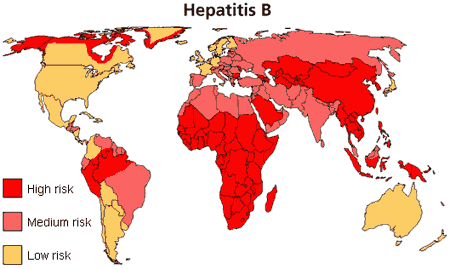
Vaccine choice is under constant attack. As of this writing, if you live in Colorado, you have a choice. You can choose to get every single one, at the exact recommended interval. You can choose to get a few here and a few there at any time you desire. You can choose to not get any at all.
Just don’t make the decision blindly. I don’t write this with intent to give you medical advice. I write this with the intent of giving you parental choice. Since I have small children and want the best for them, this is how my wife and I decide if we should vaccinate or not.
Hepatitis B Vaccine:
If you have a traditional hospital birth, you have to decide within minutes of your baby being born if you want your little bundle to have the hep B vaccine. It’s the very first shot your child is recommended to receive. The child is also expected to get this shot at 1-2 months and 6-18 months for a total of 3 shots.
Is your child at risk for Hepatitis B? It shouldn’t be the shot that shapes your opinion. The risk of Hepatitis B should be what shapes your opinion.
According to the CDC’s Hepatitis B Vaccine Information Sheet, you be the judge.
Who is at risk for Hepatitis B?
• A baby whose mother is infected can be infected at birth;
• Children, adolescents, and adults can become infected by:
– contact with blood and body fluids through breaks in the skin such as bites, cuts, or sores;
– contact with objects that have blood or body fluids on them such as toothbrushes, razors, or monitoring and treatment devices for diabetes;
– having unprotected sex with an infected person;
– sharing needles when injecting drugs;
– being stuck with a used needle. (Does anyone else see the irony here?)
– household contacts of people infected with hepatitis B,
– residents and staff in institutions for the developmentally disabled,
– kidney dialysis patients,
– people who travel to countries where hepatitis B is common,
– people with HIV infection.
For a baby less than 60 minutes old, the only real risk I see for being Hepatitis B positive is if the mom is positive. Just like HIV, not all positive moms have positive babies. So having a mom with Hep B isn’t a guarantee that the baby is positive for Hep B. If mom is positive, have baby tested.
Maybe the baby is born into a family of IV drug users who sexually abuse infants. If this is the case, Hepatitis B is the least of your concerns.
Dangers of Hepatitis B:
- Scarring of the Liver (Cirrhosis).
- Liver Cancer
- Liver Failure
- Other: Kidney disease, anemia, inflammation of the blood vessels.
Those sound pretty scary. I could argue that IV drug users are also heavy drinkers and do lots of other drugs, including prescription, which would ALL cause an immense burden on the liver. Is it just the hepatitis that destroys the liver or could other factors be at play?
Will I Die Young?
Good question. There’s no stats to say so, unless you look at Taiwan. Apparently Taiwan has a HUGE hepatitis B problem. Who knew?
A small decrease in life expectancy, from 82.0 to 80.1 years, was found for female non-carriers versus female carriers; a larger discrepancy was observed for males-from 76.2 to 71.8 years. – Model of life expectancy of chronic hepatitis B carriers in an endemic region. J Epidemiol. 2009;19(6):311-8. Epub 2009 Oct 3.
If you’re a woman, you may lose 2 years of life. If you’re a dude, you’re looking at 4 years lost. But with all that sex, drugs, and rock and roll, you probably think you had a good life, I’m sure you don’t mind checking out a few years early.
The CDC states there are between 2,000 to 4,000 deaths from cirrhosis or liver cancer caused by hepatitis B in the US. Let’s call it 3,000. If there are 315 million Americans, that puts your risk at dying from Hepatitis B complicated liver cancer or cirrhosis at 0.00095%. In other words, even if you did get hepatitis B, you have a 99.99905% chance of dying from something else.
If we follow suite from Taiwan where people die in their elder years with hepatitis B, they lived a long life without the vaccine. The shot wasn’t in wide spread use until 1991 so there’s no way of attributing the decrease in death rate of hep B to vaccine usage since not many over the age of 25 have ever had the vaccine.
You have a greater chance of dying from sitting.
Will I Get Hepatitis B?
The CDC states that there are an estimated 38,000 new cases of Hep B each in 2009. If this is consistent every year, than today you would have a 0.012% of contracting Hepatitis B. If you’re an IV drug user that has unprotected sex, you make up the majority of this risk. Even if you do have those practices, your chance of being hepatitis B free is 99.988%.
Is the Shot Risky?
From the Recombivax HB package insert, section 6.
6 ADVERSE REACTIONS
In healthy infants and children (up to 10 years of age), the most frequently reported systemic adverse reactions (>1% injections), in decreasing order of frequency, were irritability, fever, diarrhea, fatigue/weakness, diminished appetite, and rhinitis. In healthy adults, injection site reactions and systemic adverse reactions were reported following 17% and 15% of the injections, respectively.
6.1 Clinical Trials Experience
Because clinical trials are conducted under widely varying conditions, adverse reaction rates observed in the clinical trials of a vaccine cannot be directly compared to rates in the clinical trials of another vaccine and may not reflect the rates observed in practice.
In three clinical studies, 434 doses of RECOMBIVAX HB, 5 mcg, were administered to 147 healthy infants and children (up to 10 years of age) who were monitored for 5 days after each dose. Injection site reactions and systemic adverse reactions were reported following 0.2% and 10.4% of the injections, respectively. The most frequently reported systemic adverse reactions (>1% injections), in decreasing order of frequency, were irritability, fever (101°F oral equivalent), diarrhea, fatigue/weakness, diminished appetite, and rhinitis.
In a study that compared the three-dose regimen (5 mcg) with the two-dose regimen (10 mcg) of RECOMBIVAX HB in adolescents, the overall frequency of adverse reactions was generally similar.
In a group of studies, 3258 doses of RECOMBIVAX HB, 10 mcg, were administered to 1252 healthy adults who were monitored for 5 days after each dose. Injection site reactions and systemic adverse reactions were reported following 17% and 15% of the injections, respectively. The following adverse reactions were reported:
Incidence Equal To or Greater Than 1% of Injections. (Remember your chance of even getting Hepatitis B is 0.012%. This means you have at least 83x the chance of getting any of the following reactions compared to getting Hepatitis B. Life is risky, where are you going to take chances?)
GENERAL DISORDERS AND ADMINISTRATION SITE CONDITIONS
Injection site reactions consisting principally of soreness, and including pain, tenderness, pruritus, erythema, ecchymosis, swelling, warmth, nodule formation. The most frequent systemic complaints include fatigue/weakness; headache; fever (≥100°F); malaise.
GASTROINTESTINAL DISORDERS
Nausea; diarrhea
RESPIRATORY, THORACIC AND MEDIASTINAL DISORDERS
Pharyngitis; upper respiratory infection Incidence Less Than 1% of Injections
GENERAL DISORDERS AND ADMINISTRATION SITE CONDITIONS
Sweating; achiness; sensation of warmth; lightheadedness; chills; flushing
GASTROINTESTINAL DISORDERS
Vomiting; abdominal pains/cramps; dyspepsia; diminished appetite
RESPIRATORY, THORACIC AND MEDIASTINAL DISORDERS
Rhinitis; influenza; cough
NERVOUS SYSTEM DISORDERS
Vertigo/dizziness; paresthesia
SKIN AND SUBCUTANEOUS TISSUE DISORDERS
Pruritus; rash (non-specified); angioedema; urticaria
MUSCULOSKELETAL AND CONNECTIVE TISSUE DISORDERS
Arthralgia including monoarticular; myalgia; back pain; neck pain; shoulder pain; neck stiffness
BLOOD AND LYMPHATIC DISORDERS
Lymphadenopathy
PSYCHIATRIC DISORDERS
Insomnia/disturbed sleep
EAR AND LABYRINTH DISORDERS
Earache
RENAL AND URINARY DISORDERS
Dysuria
CARDIAC DISORDERS
Hypotension
6.2 Post-Marketing Experience. These are reported by you, the parents after the shot is already on the market, where you are then the guinea pig for safety.
The following additional adverse reactions have been reported with use of the marketed vaccine. Because these reactions are reported voluntarily from a population of uncertain size, it is not possible to reliably estimate their frequency or establish a causal relationship to a vaccine exposure.
Immune System Disorders
Hypersensitivity reactions including anaphylactic/anaphylactoid reactions, bronchospasm, and urticaria have been reported within the first few hours after vaccination. An apparent hypersensitivity syndrome (serum-sickness-like) of delayed onset has been reported days to weeks after vaccination, including: arthralgia/arthritis (usually transient), fever, and dermatologic reactions such as urticaria, erythema multiforme, ecchymoses and erythema nodosum [see Warnings and Precautions (5.1)]. Autoimmune diseases including systemic lupus erythematosus (SLE), lupus-like syndrome, vasculitis, and polyarteritis nodosa have also been reported.
Gastrointestinal Disorders
Elevation of liver enzymes; constipation
Nervous System Disorders
Guillain-Barré syndrome; multiple sclerosis; exacerbation of multiple sclerosis; myelitis including transverse myelitis; seizure; febrile seizure; peripheral neuropathy including Bell’s Palsy; radiculopathy; herpes zoster; migraine; muscle weakness; hypesthesia; encephalitis
Skin and Subcutaneous Disorders
Stevens-Johnson syndrome; alopecia; petechiae; eczema
Musculoskeletal and Connective Tissue Disorders
Arthritis Pain in extremity
Blood and Lymphatic System Disorders
Increased erythrocyte sedimentation rate; thrombocytopenia
Psychiatric Disorders
Irritability; agitation; somnolence
Eye Disorders
Optic neuritis; tinnitus; conjunctivitis; visual disturbances; uveitis
Cardiac Disorders
Syncope; tachycardia
Most of those reactions are non-threatening and have little to no effect on childhood development or health. But then again, some of those are serious. Only you can decide what type of risk you are willing to mitigate. There’s no right or wrong answer to whether you decide to vaccinate or not. You have to do what’s best for your family. If you choose to vaccinate, you shouldn’t worry about the other kids that aren’t, your kid is protected, right? If you choose not to vaccinate, you shouldn’t worry about the kid that is vaccinated, he’s protected, right?
The wrong answer is that more and more states are trying to take that decision ability away. You may be all for the MMR or polio vaccine but think the Hep B or flu shot is totally ridiculous. There is a time coming where you won’t have that choice. To vaccinate or not is not a health issue, it’s a parental issue. You know what’s best for your child, don’t give up that power to parent.
References:
http://www.cdc.gov/vaccines/hcp/vis/vis-statements/hep-b.pdf
http://www.mayoclinic.org/diseases-conditions/hepatitis-b/basics/complications/con-20022210
J Epidemiol. 2009;19(6):311-8. Epub 2009 Oct 3.
https://www.merck.com/product/usa/pi_circulars/r/recombivax_hb/recombivax_pi.pdf




0 Comments